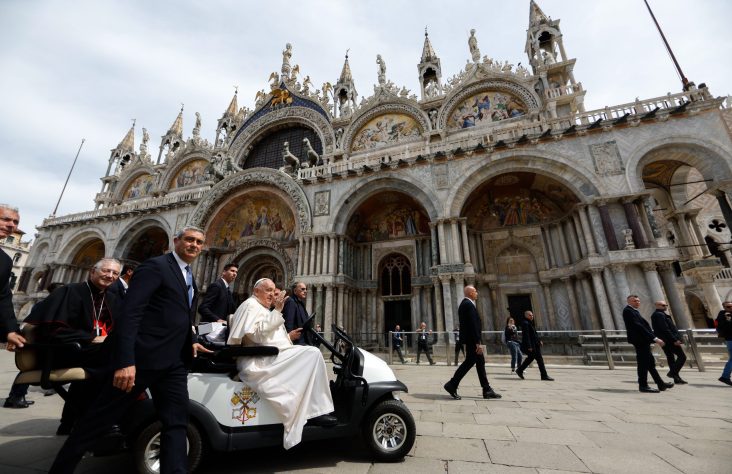September 26, 2023 // National
In Marseille, Pope Says Welcoming the ‘Stranger’ Is a Global Mandate
VATICAN CITY (CNS) – In a visit of less than 30 hours to Marseille, France, Pope Francis highlighted his key appeals and positions concerning migration and the mandate for people of faith to care for the “stranger” in one’s land.
With just four main events and accompanying speeches, “I hope I have the courage to say everything I have to say,” he told the journalists flying with him from Rome for the trip, which took place Friday, September 22, and Saturday, September 23.

Four children and a young man give Pope Francis gifts while French Prime Minister Élisabeth Borne looks on during a brief welcoming ceremony at Marseille International Airport in Marseille, France, Sept. 22, 2023. (CNS photo/Vatican Media)
What he said, in essence, has been the main thrust of his pontificate: The world must choose either the path of human fraternity and cooperation to have any kind of peaceful future or choose the downward spiral of indifference, division, and confrontation. And, most importantly, the faithful must be exemplary models of the right path of sharing and caring for the outcast with joy and compassion.
The trip to the port city of Marseille was less about the city or nation and more about the Mediterranean Sea it touches. The Mediterranean has been a constant concern of this pope. It is the most dangerous migration route in the world, according to the International Organization for Migration. The minimum estimated number of recorded deaths between 2014 and 2022 is more than 24,000 people.
No other place comes close: Minimum estimates for the same period for the Sahara Desert are 5,323 fatalities, and the estimate for the U.S.-Mexico border crossing stands at 3,761 people dead.
“We need deeds, not words,” Pope Francis said during a powerful moment before he led a minute of silence with bishops from around the Mediterranean, local religious leaders, and groups assisting migrants.
All migrants are people who have names, faces, hopes, and dreams, he said at a memorial overlooking the sea, and those “who are at risk of drowning when abandoned on the waves must be rescued. It is a duty of humanity; it is a duty of civilization!”
The cultural and religious diversity on display at the memorial ceremony and in Marseille underlined another important message of the pope: Diversity can be an opportunity, not a threat. He praised the city’s longstanding active dedication to interreligious dialogue and mutual cooperation on concrete issues promoting fraternity and peaceful coexistence.
Like a handful of other trips, the prime purpose of the pope’s visit was to encourage a major event being held there; in this case, it was part of a Church-led series of meetings that brings bishops from around the Mediterranean region together with a variety of other leaders and young people. The meetings, which began in Bari, Italy, in 2020, recognize that the complex problems of migration, human trafficking, environmental degradation, conflict, and economic disparities between North and South require strategies and solutions that involve multiple nations and sectors of society.
In a lengthy speech at the final session of the “Mediterranean Meetings” at the Pharo Palace on Saturday, September 23, the pope covered all of that as well as some hot-button political issues.
The duty to protect the dignity and foster the well-being of every migrant is no different from the duty to protect the unborn, the elderly, young people who lack guidance, exploited workers, families, and those who are escaping violence and persecution, he said, effectively condemning moves or current measures to support abortion, “assisted dying,” cutbacks to social or economic opportunities, and to not recognize the rights of refugees or deny them full citizenship.
“Indeed, the real social evil is not so much the increase of problems but the decrease of care,” especially for the most vulnerable, he said.
When it comes to migration, people have the right to not have to flee their homes, he said in that speech, and this calls for greater global justice.
“The Mediterranean mirrors the world,” he said, with the North exuding “affluence, consumerism, and waste” while the South or developing countries are “plagued by instability, regimes, wars, and desertification” and look to who are well-off.
The change needed for “peace to take root,” he said, is for communities to treat newcomers as brothers and sisters, “not as troublesome problems,” to integrate them and give them dignity through coordinated, equitable, legal, and regular channels of entry.
The trip was a prelude to the September 24 World Day of Migrants and Refugees, which was celebrated in Marseille by Cardinal Michael Czerny, Prefect of the Dicastery for Promoting Integral Human Development.
Echoing the pope’s words, he said in his homily that the world must commit to ensuring migration pathways that are “orderly and safe, guaranteeing that everyone’s rights and dignity are respected. This requires knocking on doors, expanding regular migration channels, and the chance to become ‘full citizens.’”
“Because all have in common the same hope: to be able to guarantee a dignified life for themselves and their families,” he said.
The best news. Delivered to your inbox.
Subscribe to our mailing list today.






